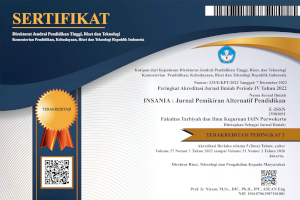Pemetaan Kompetensi Pedagogik Pendidik Kelompok Bermain Di Kecamatan Bumiayu Kabupaten Brebes Tahun 2014
DOI:
https://doi.org/10.24090/insania.v20i1.1422Abstract
Abstract: The purpose of this study was to map the pedagogical competence of playgroup (KB) educators in kecamatan Bumiayu in 2014. The results of the mapping can be used to determine how the quality of early childhood educators in kecamatan Bumiayu that can serve as a media controller quality ECD services. This study is a survey using a descriptive-quantitative approach. Data collected by using questionnaires, interviews, and documentaries. The collected data were then analyzed using the relative frequency distribution formula or percentage. Based on the results of research and discussion, pedagogic abilities KB educators in kecamatan bumiayu could be mapped as follows: (1) The result of the questionnaire showed that 44% of family planning educator in kecamatan bumiayu agree if they have pedagigic competence. (2) 45% of educator KB in kecamatan bumiayu agree if they have the ability to plan the educational program, parenting, and child protection. (3) 43% of educator KB in kecamatan bumiayu agree if they are able to carry out the process of education, care and protection. (4) 46% of educator KB in kecamatan bumiayu agree if they are able to carry out an assessment of the prosess and outcomes of education, care , and protection. Thus, the percentage of these four capabilities fall into the ‘quite well’ category. Keywords: pedagogical. educators, group play.Downloads
Published
How to Cite
Issue
Section
License
Authors who publish with this journal agree to the following terms:
Authors retain copyright and grant the journal right of first publication with the work simultaneously licensed under a Creative CommonsAttribution-ShareAlike License that allows others to share the work with an acknowledgment of the work's authorship and initial publication in this journal.
Authors are able to enter into separate, additional contractual arrangements for the non-exclusive distribution of the journal's published version of the work (e.g., post it to an institutional repository or publish it in a book), with an acknowledgment of its initial publication in this journal.
Authors are permitted and encouraged to post their work online (e.g., in institutional repositories or on their website) prior to and during the submission process, as it can lead to productive exchanges, as well as earlier and greater citation of published work (See The Effect of Open Access).








